University Research Methods in Health and Social Care Report
VerifiedAdded on 2023/06/08
|12
|3506
|256
Report
AI Summary
This report delves into research methods relevant to health and social care management. It examines the contribution of research to health and social care provision, critically evaluates research philosophies, and explores different research approaches, including inductive approaches and secondary data analysis. The report details the elements of a research proposal, including the justification, design, and ethical considerations. It analyzes types and sources of research data, focusing on qualitative data analysis, and draws conclusions from the collected data. The report also analyzes the relationship between research and evidence-based practice, evaluating existing research and its contribution to the field. The report covers two specific tasks: the impact of poor inter-professional collaboration on health and social care, and the evaluation of a health and social care program to improve outcomes following critical illness. It discusses methodologies, data collection, analysis, and ethical considerations, providing a comprehensive overview of the research process within the healthcare context.
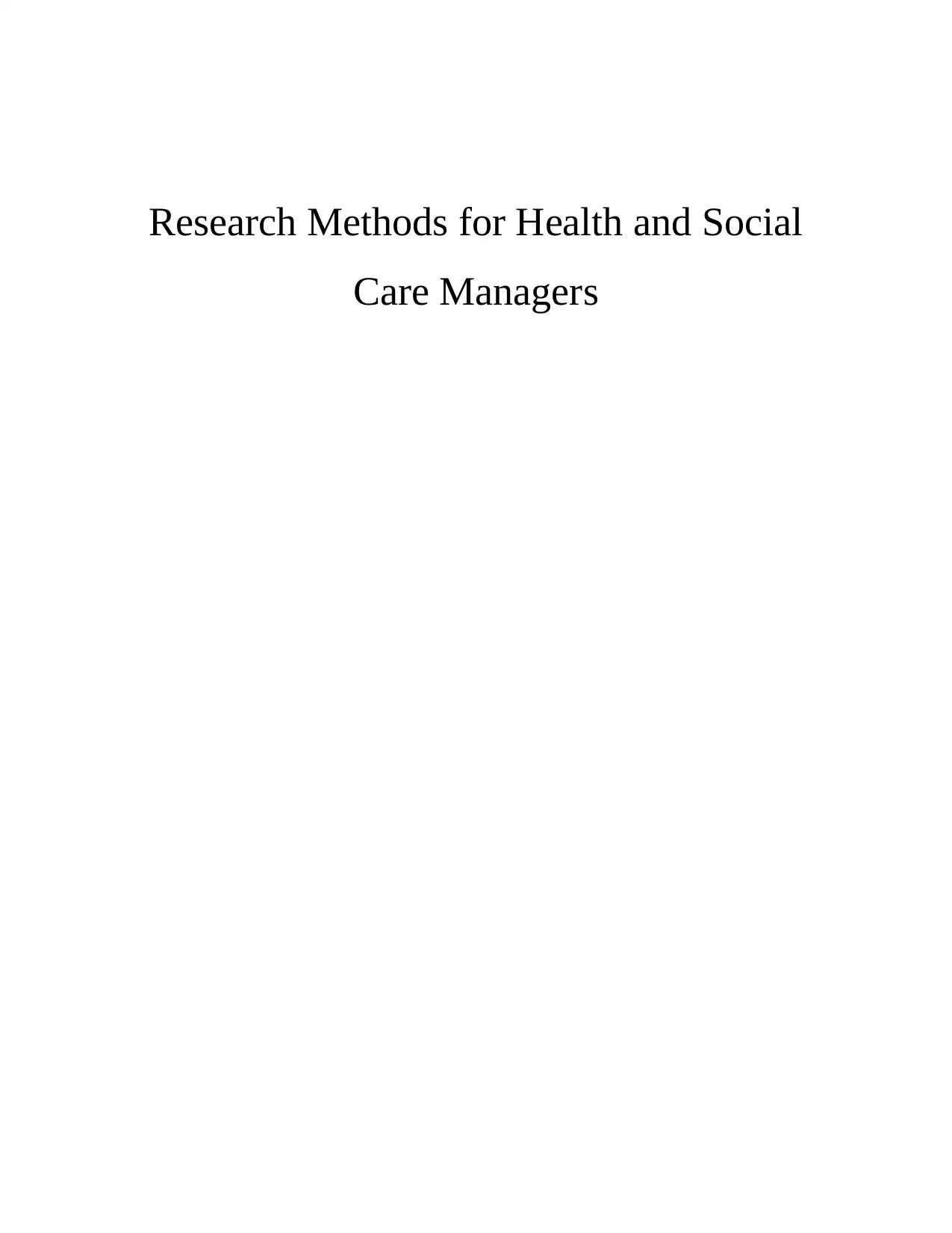
Research Methods for Health and Social
Care Managers
Care Managers
Paraphrase This Document
Need a fresh take? Get an instant paraphrase of this document with our AI Paraphraser
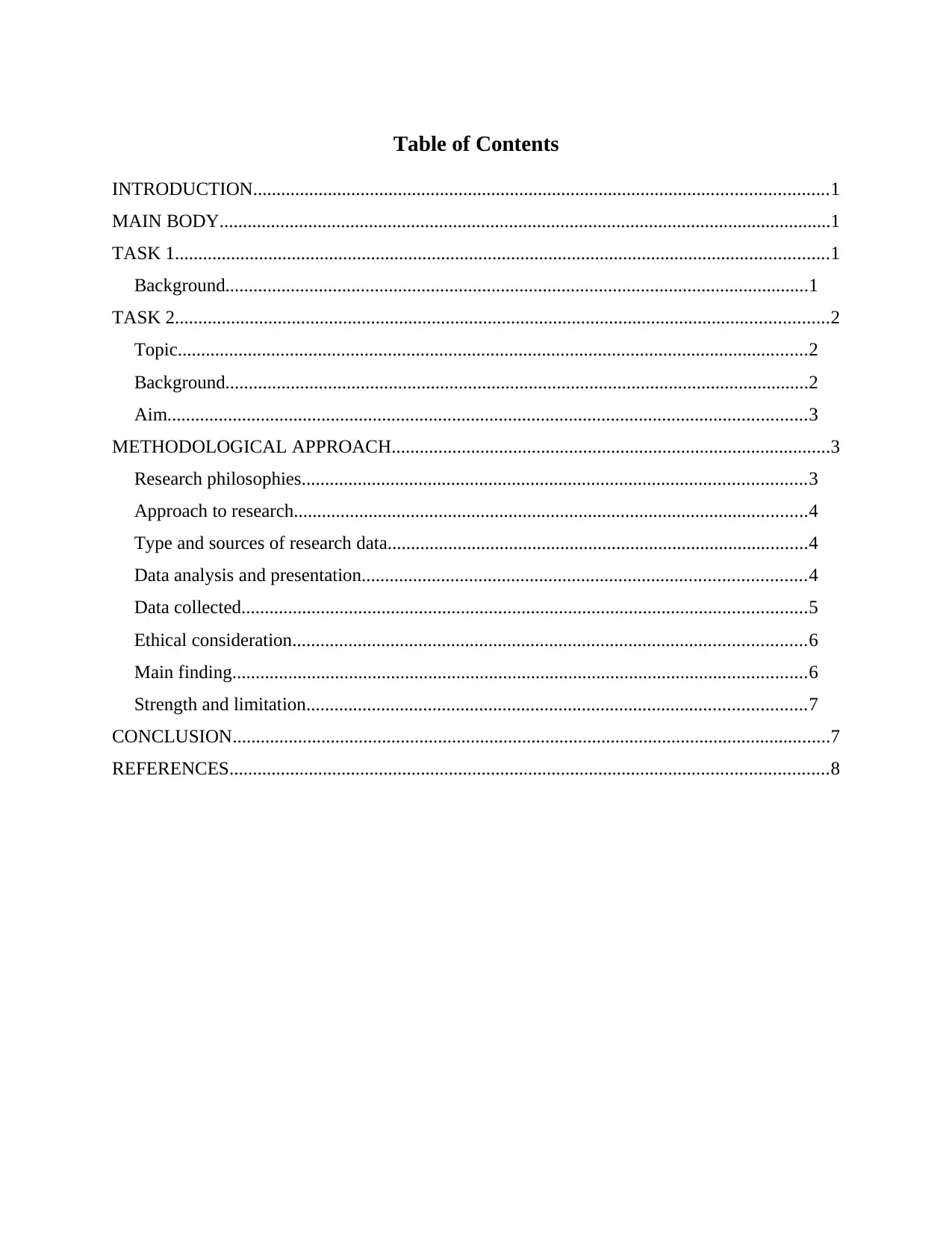
Table of Contents
INTRODUCTION...........................................................................................................................1
MAIN BODY...................................................................................................................................1
TASK 1............................................................................................................................................1
Background.............................................................................................................................1
TASK 2............................................................................................................................................2
Topic.......................................................................................................................................2
Background.............................................................................................................................2
Aim.........................................................................................................................................3
METHODOLOGICAL APPROACH..............................................................................................3
Research philosophies............................................................................................................3
Approach to research..............................................................................................................4
Type and sources of research data..........................................................................................4
Data analysis and presentation...............................................................................................4
Data collected.........................................................................................................................5
Ethical consideration..............................................................................................................6
Main finding...........................................................................................................................6
Strength and limitation...........................................................................................................7
CONCLUSION................................................................................................................................7
REFERENCES................................................................................................................................8
INTRODUCTION...........................................................................................................................1
MAIN BODY...................................................................................................................................1
TASK 1............................................................................................................................................1
Background.............................................................................................................................1
TASK 2............................................................................................................................................2
Topic.......................................................................................................................................2
Background.............................................................................................................................2
Aim.........................................................................................................................................3
METHODOLOGICAL APPROACH..............................................................................................3
Research philosophies............................................................................................................3
Approach to research..............................................................................................................4
Type and sources of research data..........................................................................................4
Data analysis and presentation...............................................................................................4
Data collected.........................................................................................................................5
Ethical consideration..............................................................................................................6
Main finding...........................................................................................................................6
Strength and limitation...........................................................................................................7
CONCLUSION................................................................................................................................7
REFERENCES................................................................................................................................8
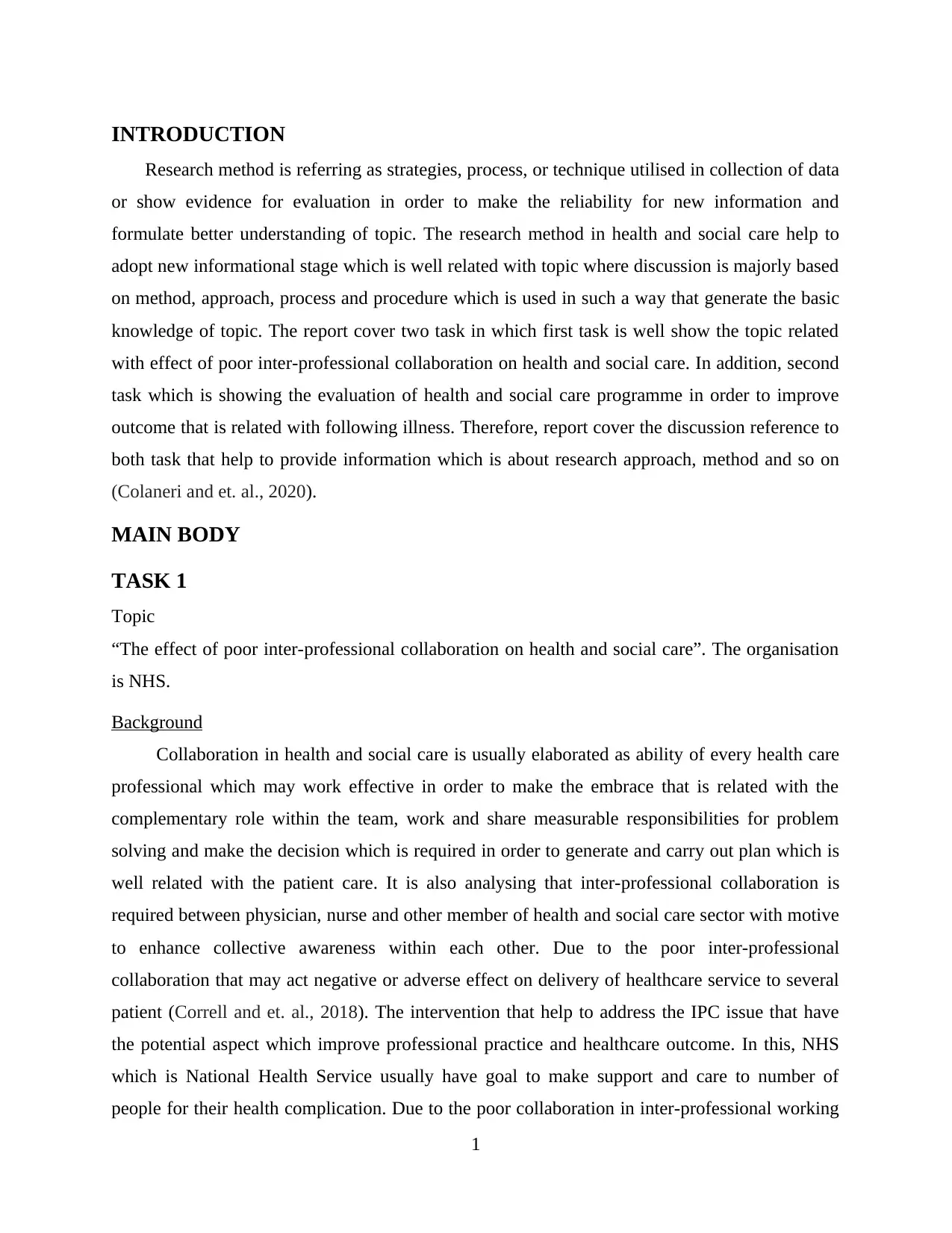
INTRODUCTION
Research method is referring as strategies, process, or technique utilised in collection of data
or show evidence for evaluation in order to make the reliability for new information and
formulate better understanding of topic. The research method in health and social care help to
adopt new informational stage which is well related with topic where discussion is majorly based
on method, approach, process and procedure which is used in such a way that generate the basic
knowledge of topic. The report cover two task in which first task is well show the topic related
with effect of poor inter-professional collaboration on health and social care. In addition, second
task which is showing the evaluation of health and social care programme in order to improve
outcome that is related with following illness. Therefore, report cover the discussion reference to
both task that help to provide information which is about research approach, method and so on
(Colaneri and et. al., 2020).
MAIN BODY
TASK 1
Topic
“The effect of poor inter-professional collaboration on health and social care”. The organisation
is NHS.
Background
Collaboration in health and social care is usually elaborated as ability of every health care
professional which may work effective in order to make the embrace that is related with the
complementary role within the team, work and share measurable responsibilities for problem
solving and make the decision which is required in order to generate and carry out plan which is
well related with the patient care. It is also analysing that inter-professional collaboration is
required between physician, nurse and other member of health and social care sector with motive
to enhance collective awareness within each other. Due to the poor inter-professional
collaboration that may act negative or adverse effect on delivery of healthcare service to several
patient (Correll and et. al., 2018). The intervention that help to address the IPC issue that have
the potential aspect which improve professional practice and healthcare outcome. In this, NHS
which is National Health Service usually have goal to make support and care to number of
people for their health complication. Due to the poor collaboration in inter-professional working
1
Research method is referring as strategies, process, or technique utilised in collection of data
or show evidence for evaluation in order to make the reliability for new information and
formulate better understanding of topic. The research method in health and social care help to
adopt new informational stage which is well related with topic where discussion is majorly based
on method, approach, process and procedure which is used in such a way that generate the basic
knowledge of topic. The report cover two task in which first task is well show the topic related
with effect of poor inter-professional collaboration on health and social care. In addition, second
task which is showing the evaluation of health and social care programme in order to improve
outcome that is related with following illness. Therefore, report cover the discussion reference to
both task that help to provide information which is about research approach, method and so on
(Colaneri and et. al., 2020).
MAIN BODY
TASK 1
Topic
“The effect of poor inter-professional collaboration on health and social care”. The organisation
is NHS.
Background
Collaboration in health and social care is usually elaborated as ability of every health care
professional which may work effective in order to make the embrace that is related with the
complementary role within the team, work and share measurable responsibilities for problem
solving and make the decision which is required in order to generate and carry out plan which is
well related with the patient care. It is also analysing that inter-professional collaboration is
required between physician, nurse and other member of health and social care sector with motive
to enhance collective awareness within each other. Due to the poor inter-professional
collaboration that may act negative or adverse effect on delivery of healthcare service to several
patient (Correll and et. al., 2018). The intervention that help to address the IPC issue that have
the potential aspect which improve professional practice and healthcare outcome. In this, NHS
which is National Health Service usually have goal to make support and care to number of
people for their health complication. Due to the poor collaboration in inter-professional working
1
⊘ This is a preview!⊘
Do you want full access?
Subscribe today to unlock all pages.

Trusted by 1+ million students worldwide
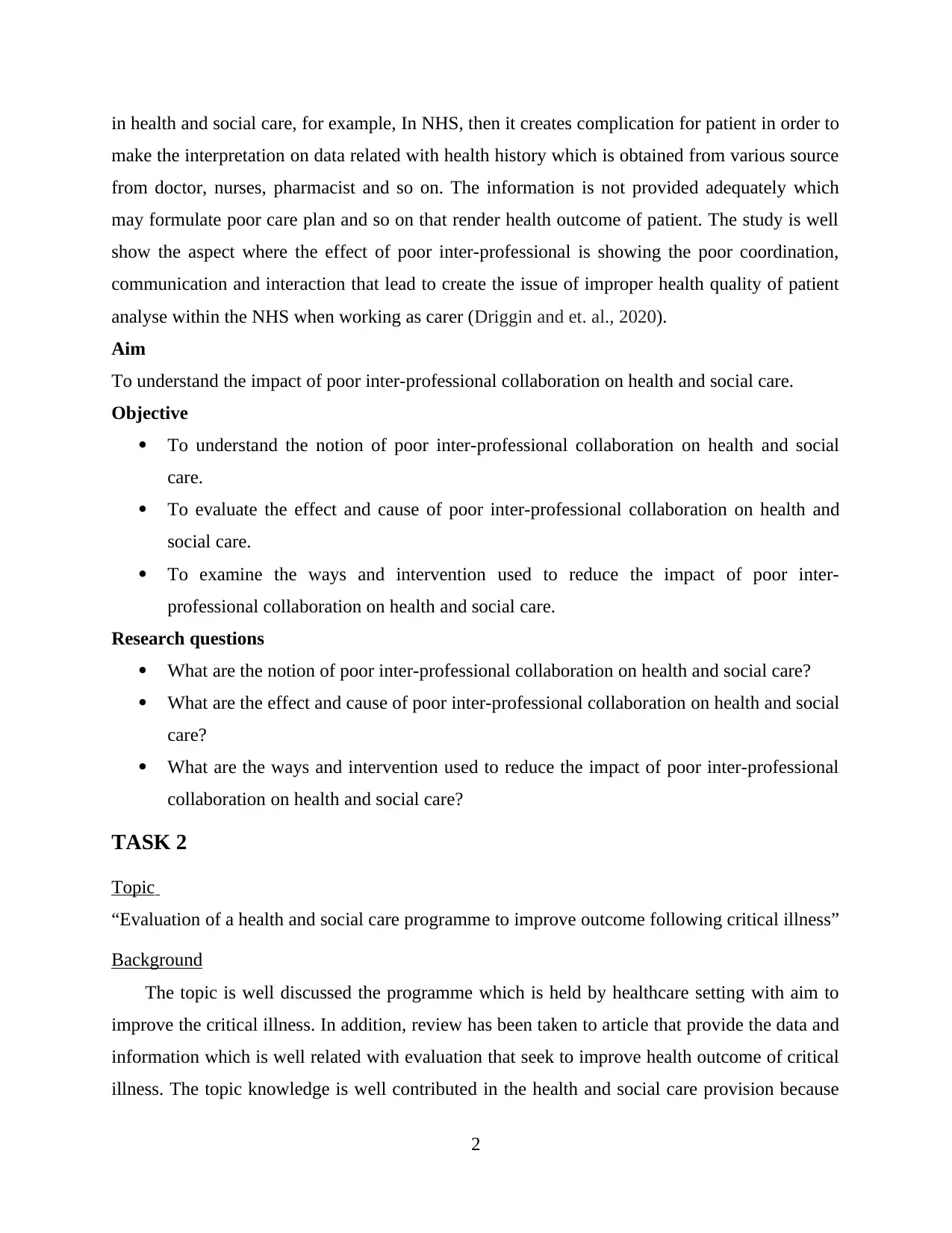
in health and social care, for example, In NHS, then it creates complication for patient in order to
make the interpretation on data related with health history which is obtained from various source
from doctor, nurses, pharmacist and so on. The information is not provided adequately which
may formulate poor care plan and so on that render health outcome of patient. The study is well
show the aspect where the effect of poor inter-professional is showing the poor coordination,
communication and interaction that lead to create the issue of improper health quality of patient
analyse within the NHS when working as carer (Driggin and et. al., 2020).
Aim
To understand the impact of poor inter-professional collaboration on health and social care.
Objective
To understand the notion of poor inter-professional collaboration on health and social
care.
To evaluate the effect and cause of poor inter-professional collaboration on health and
social care.
To examine the ways and intervention used to reduce the impact of poor inter-
professional collaboration on health and social care.
Research questions
What are the notion of poor inter-professional collaboration on health and social care?
What are the effect and cause of poor inter-professional collaboration on health and social
care?
What are the ways and intervention used to reduce the impact of poor inter-professional
collaboration on health and social care?
TASK 2
Topic
“Evaluation of a health and social care programme to improve outcome following critical illness”
Background
The topic is well discussed the programme which is held by healthcare setting with aim to
improve the critical illness. In addition, review has been taken to article that provide the data and
information which is well related with evaluation that seek to improve health outcome of critical
illness. The topic knowledge is well contributed in the health and social care provision because
2
make the interpretation on data related with health history which is obtained from various source
from doctor, nurses, pharmacist and so on. The information is not provided adequately which
may formulate poor care plan and so on that render health outcome of patient. The study is well
show the aspect where the effect of poor inter-professional is showing the poor coordination,
communication and interaction that lead to create the issue of improper health quality of patient
analyse within the NHS when working as carer (Driggin and et. al., 2020).
Aim
To understand the impact of poor inter-professional collaboration on health and social care.
Objective
To understand the notion of poor inter-professional collaboration on health and social
care.
To evaluate the effect and cause of poor inter-professional collaboration on health and
social care.
To examine the ways and intervention used to reduce the impact of poor inter-
professional collaboration on health and social care.
Research questions
What are the notion of poor inter-professional collaboration on health and social care?
What are the effect and cause of poor inter-professional collaboration on health and social
care?
What are the ways and intervention used to reduce the impact of poor inter-professional
collaboration on health and social care?
TASK 2
Topic
“Evaluation of a health and social care programme to improve outcome following critical illness”
Background
The topic is well discussed the programme which is held by healthcare setting with aim to
improve the critical illness. In addition, review has been taken to article that provide the data and
information which is well related with evaluation that seek to improve health outcome of critical
illness. The topic knowledge is well contributed in the health and social care provision because
2
Paraphrase This Document
Need a fresh take? Get an instant paraphrase of this document with our AI Paraphraser
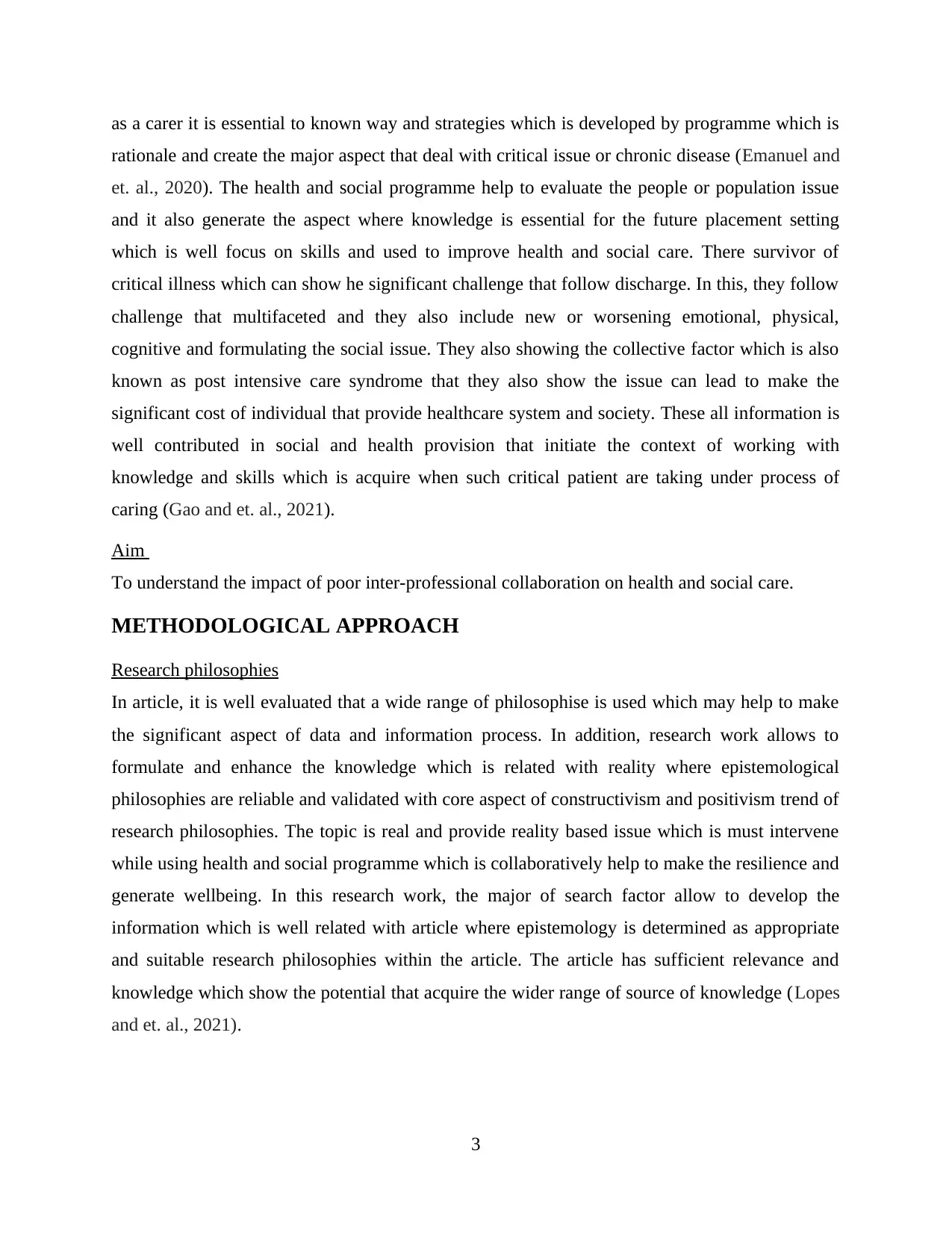
as a carer it is essential to known way and strategies which is developed by programme which is
rationale and create the major aspect that deal with critical issue or chronic disease (Emanuel and
et. al., 2020). The health and social programme help to evaluate the people or population issue
and it also generate the aspect where knowledge is essential for the future placement setting
which is well focus on skills and used to improve health and social care. There survivor of
critical illness which can show he significant challenge that follow discharge. In this, they follow
challenge that multifaceted and they also include new or worsening emotional, physical,
cognitive and formulating the social issue. They also showing the collective factor which is also
known as post intensive care syndrome that they also show the issue can lead to make the
significant cost of individual that provide healthcare system and society. These all information is
well contributed in social and health provision that initiate the context of working with
knowledge and skills which is acquire when such critical patient are taking under process of
caring (Gao and et. al., 2021).
Aim
To understand the impact of poor inter-professional collaboration on health and social care.
METHODOLOGICAL APPROACH
Research philosophies
In article, it is well evaluated that a wide range of philosophise is used which may help to make
the significant aspect of data and information process. In addition, research work allows to
formulate and enhance the knowledge which is related with reality where epistemological
philosophies are reliable and validated with core aspect of constructivism and positivism trend of
research philosophies. The topic is real and provide reality based issue which is must intervene
while using health and social programme which is collaboratively help to make the resilience and
generate wellbeing. In this research work, the major of search factor allow to develop the
information which is well related with article where epistemology is determined as appropriate
and suitable research philosophies within the article. The article has sufficient relevance and
knowledge which show the potential that acquire the wider range of source of knowledge (Lopes
and et. al., 2021).
3
rationale and create the major aspect that deal with critical issue or chronic disease (Emanuel and
et. al., 2020). The health and social programme help to evaluate the people or population issue
and it also generate the aspect where knowledge is essential for the future placement setting
which is well focus on skills and used to improve health and social care. There survivor of
critical illness which can show he significant challenge that follow discharge. In this, they follow
challenge that multifaceted and they also include new or worsening emotional, physical,
cognitive and formulating the social issue. They also showing the collective factor which is also
known as post intensive care syndrome that they also show the issue can lead to make the
significant cost of individual that provide healthcare system and society. These all information is
well contributed in social and health provision that initiate the context of working with
knowledge and skills which is acquire when such critical patient are taking under process of
caring (Gao and et. al., 2021).
Aim
To understand the impact of poor inter-professional collaboration on health and social care.
METHODOLOGICAL APPROACH
Research philosophies
In article, it is well evaluated that a wide range of philosophise is used which may help to make
the significant aspect of data and information process. In addition, research work allows to
formulate and enhance the knowledge which is related with reality where epistemological
philosophies are reliable and validated with core aspect of constructivism and positivism trend of
research philosophies. The topic is real and provide reality based issue which is must intervene
while using health and social programme which is collaboratively help to make the resilience and
generate wellbeing. In this research work, the major of search factor allow to develop the
information which is well related with article where epistemology is determined as appropriate
and suitable research philosophies within the article. The article has sufficient relevance and
knowledge which show the potential that acquire the wider range of source of knowledge (Lopes
and et. al., 2021).
3
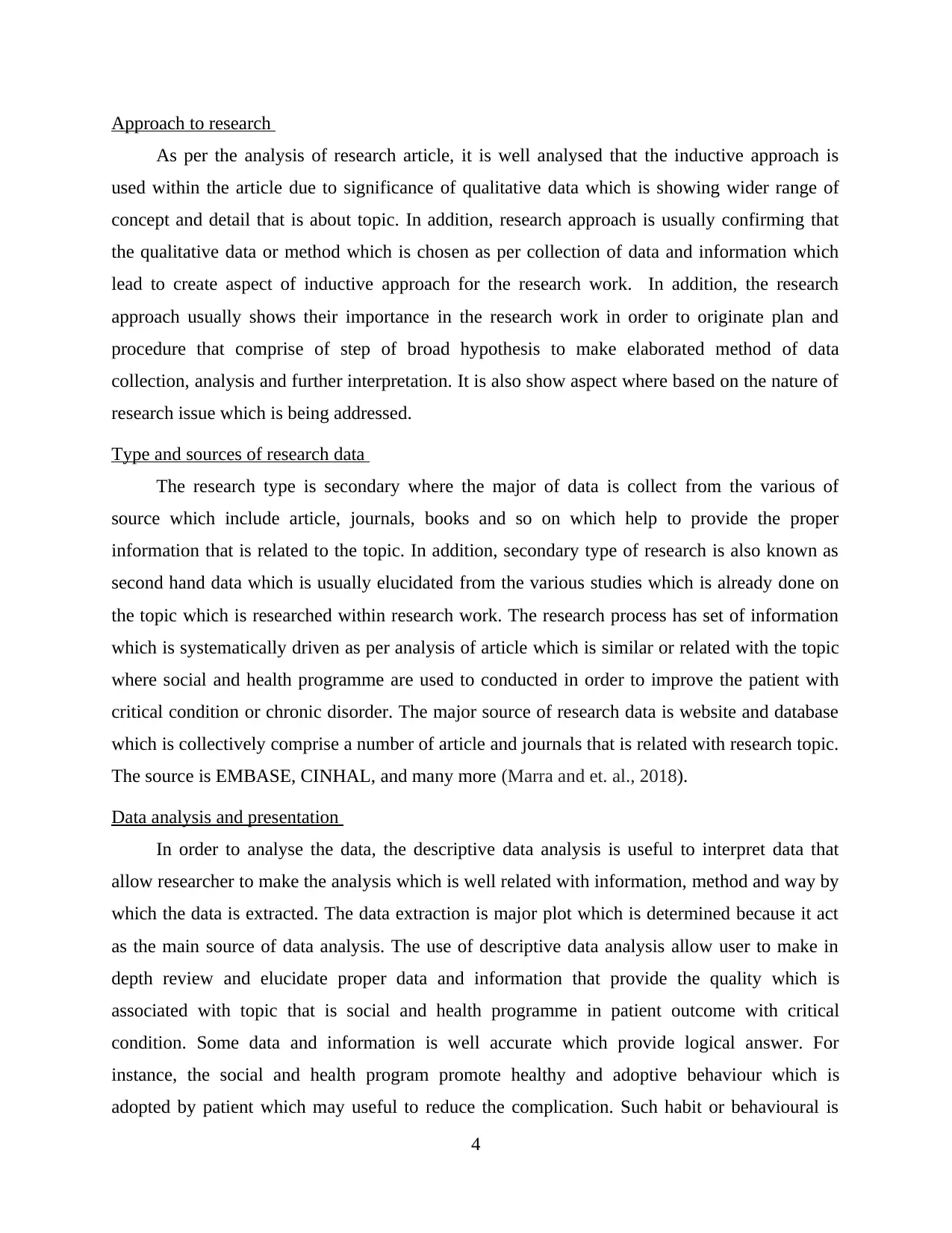
Approach to research
As per the analysis of research article, it is well analysed that the inductive approach is
used within the article due to significance of qualitative data which is showing wider range of
concept and detail that is about topic. In addition, research approach is usually confirming that
the qualitative data or method which is chosen as per collection of data and information which
lead to create aspect of inductive approach for the research work. In addition, the research
approach usually shows their importance in the research work in order to originate plan and
procedure that comprise of step of broad hypothesis to make elaborated method of data
collection, analysis and further interpretation. It is also show aspect where based on the nature of
research issue which is being addressed.
Type and sources of research data
The research type is secondary where the major of data is collect from the various of
source which include article, journals, books and so on which help to provide the proper
information that is related to the topic. In addition, secondary type of research is also known as
second hand data which is usually elucidated from the various studies which is already done on
the topic which is researched within research work. The research process has set of information
which is systematically driven as per analysis of article which is similar or related with the topic
where social and health programme are used to conducted in order to improve the patient with
critical condition or chronic disorder. The major source of research data is website and database
which is collectively comprise a number of article and journals that is related with research topic.
The source is EMBASE, CINHAL, and many more (Marra and et. al., 2018).
Data analysis and presentation
In order to analyse the data, the descriptive data analysis is useful to interpret data that
allow researcher to make the analysis which is well related with information, method and way by
which the data is extracted. The data extraction is major plot which is determined because it act
as the main source of data analysis. The use of descriptive data analysis allow user to make in
depth review and elucidate proper data and information that provide the quality which is
associated with topic that is social and health programme in patient outcome with critical
condition. Some data and information is well accurate which provide logical answer. For
instance, the social and health program promote healthy and adoptive behaviour which is
adopted by patient which may useful to reduce the complication. Such habit or behavioural is
4
As per the analysis of research article, it is well analysed that the inductive approach is
used within the article due to significance of qualitative data which is showing wider range of
concept and detail that is about topic. In addition, research approach is usually confirming that
the qualitative data or method which is chosen as per collection of data and information which
lead to create aspect of inductive approach for the research work. In addition, the research
approach usually shows their importance in the research work in order to originate plan and
procedure that comprise of step of broad hypothesis to make elaborated method of data
collection, analysis and further interpretation. It is also show aspect where based on the nature of
research issue which is being addressed.
Type and sources of research data
The research type is secondary where the major of data is collect from the various of
source which include article, journals, books and so on which help to provide the proper
information that is related to the topic. In addition, secondary type of research is also known as
second hand data which is usually elucidated from the various studies which is already done on
the topic which is researched within research work. The research process has set of information
which is systematically driven as per analysis of article which is similar or related with the topic
where social and health programme are used to conducted in order to improve the patient with
critical condition or chronic disorder. The major source of research data is website and database
which is collectively comprise a number of article and journals that is related with research topic.
The source is EMBASE, CINHAL, and many more (Marra and et. al., 2018).
Data analysis and presentation
In order to analyse the data, the descriptive data analysis is useful to interpret data that
allow researcher to make the analysis which is well related with information, method and way by
which the data is extracted. The data extraction is major plot which is determined because it act
as the main source of data analysis. The use of descriptive data analysis allow user to make in
depth review and elucidate proper data and information that provide the quality which is
associated with topic that is social and health programme in patient outcome with critical
condition. Some data and information is well accurate which provide logical answer. For
instance, the social and health program promote healthy and adoptive behaviour which is
adopted by patient which may useful to reduce the complication. Such habit or behavioural is
4
⊘ This is a preview!⊘
Do you want full access?
Subscribe today to unlock all pages.

Trusted by 1+ million students worldwide
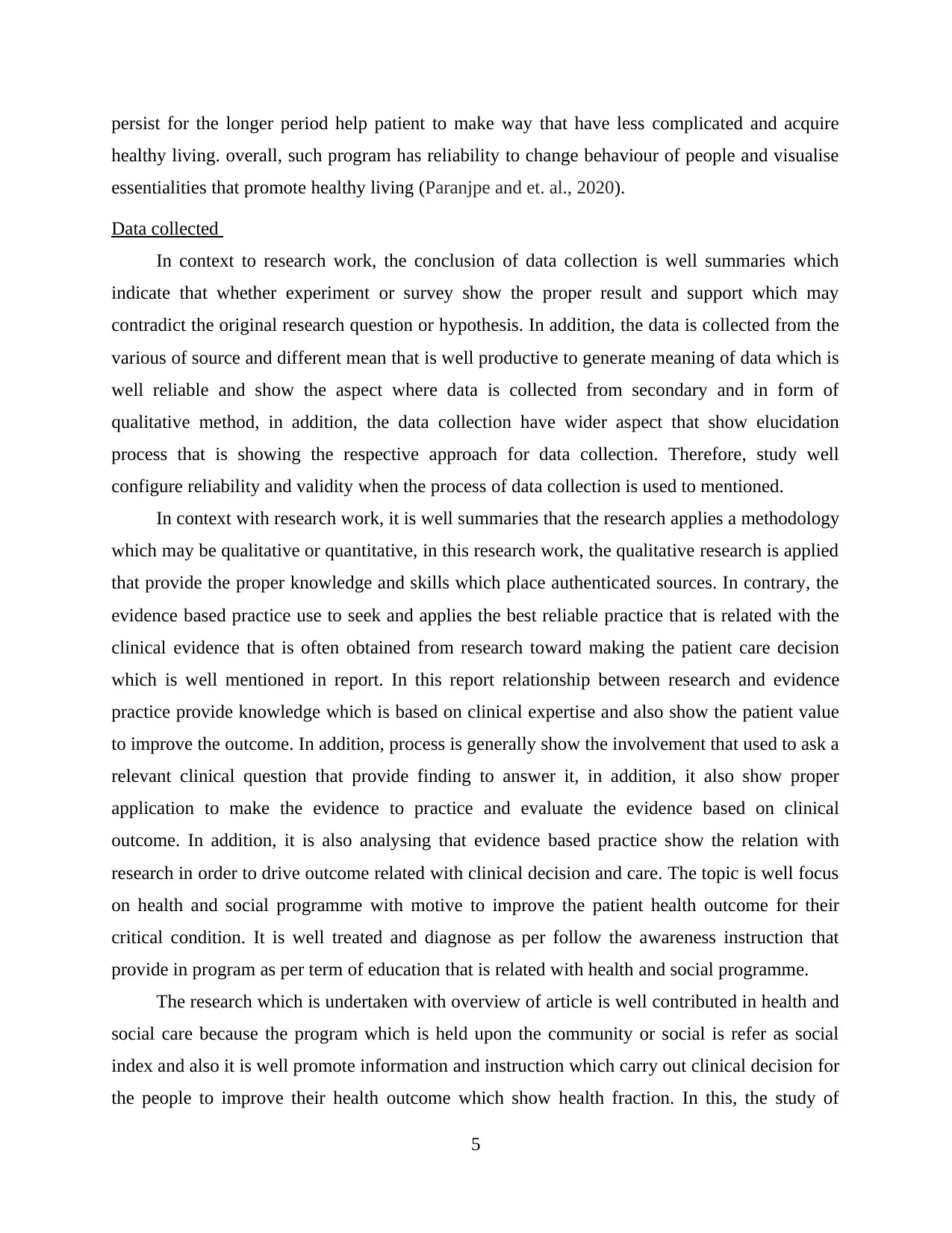
persist for the longer period help patient to make way that have less complicated and acquire
healthy living. overall, such program has reliability to change behaviour of people and visualise
essentialities that promote healthy living (Paranjpe and et. al., 2020).
Data collected
In context to research work, the conclusion of data collection is well summaries which
indicate that whether experiment or survey show the proper result and support which may
contradict the original research question or hypothesis. In addition, the data is collected from the
various of source and different mean that is well productive to generate meaning of data which is
well reliable and show the aspect where data is collected from secondary and in form of
qualitative method, in addition, the data collection have wider aspect that show elucidation
process that is showing the respective approach for data collection. Therefore, study well
configure reliability and validity when the process of data collection is used to mentioned.
In context with research work, it is well summaries that the research applies a methodology
which may be qualitative or quantitative, in this research work, the qualitative research is applied
that provide the proper knowledge and skills which place authenticated sources. In contrary, the
evidence based practice use to seek and applies the best reliable practice that is related with the
clinical evidence that is often obtained from research toward making the patient care decision
which is well mentioned in report. In this report relationship between research and evidence
practice provide knowledge which is based on clinical expertise and also show the patient value
to improve the outcome. In addition, process is generally show the involvement that used to ask a
relevant clinical question that provide finding to answer it, in addition, it also show proper
application to make the evidence to practice and evaluate the evidence based on clinical
outcome. In addition, it is also analysing that evidence based practice show the relation with
research in order to drive outcome related with clinical decision and care. The topic is well focus
on health and social programme with motive to improve the patient health outcome for their
critical condition. It is well treated and diagnose as per follow the awareness instruction that
provide in program as per term of education that is related with health and social programme.
The research which is undertaken with overview of article is well contributed in health and
social care because the program which is held upon the community or social is refer as social
index and also it is well promote information and instruction which carry out clinical decision for
the people to improve their health outcome which show health fraction. In this, the study of
5
healthy living. overall, such program has reliability to change behaviour of people and visualise
essentialities that promote healthy living (Paranjpe and et. al., 2020).
Data collected
In context to research work, the conclusion of data collection is well summaries which
indicate that whether experiment or survey show the proper result and support which may
contradict the original research question or hypothesis. In addition, the data is collected from the
various of source and different mean that is well productive to generate meaning of data which is
well reliable and show the aspect where data is collected from secondary and in form of
qualitative method, in addition, the data collection have wider aspect that show elucidation
process that is showing the respective approach for data collection. Therefore, study well
configure reliability and validity when the process of data collection is used to mentioned.
In context with research work, it is well summaries that the research applies a methodology
which may be qualitative or quantitative, in this research work, the qualitative research is applied
that provide the proper knowledge and skills which place authenticated sources. In contrary, the
evidence based practice use to seek and applies the best reliable practice that is related with the
clinical evidence that is often obtained from research toward making the patient care decision
which is well mentioned in report. In this report relationship between research and evidence
practice provide knowledge which is based on clinical expertise and also show the patient value
to improve the outcome. In addition, process is generally show the involvement that used to ask a
relevant clinical question that provide finding to answer it, in addition, it also show proper
application to make the evidence to practice and evaluate the evidence based on clinical
outcome. In addition, it is also analysing that evidence based practice show the relation with
research in order to drive outcome related with clinical decision and care. The topic is well focus
on health and social programme with motive to improve the patient health outcome for their
critical condition. It is well treated and diagnose as per follow the awareness instruction that
provide in program as per term of education that is related with health and social programme.
The research which is undertaken with overview of article is well contributed in health and
social care because the program which is held upon the community or social is refer as social
index and also it is well promote information and instruction which carry out clinical decision for
the people to improve their health outcome which show health fraction. In this, the study of
5
Paraphrase This Document
Need a fresh take? Get an instant paraphrase of this document with our AI Paraphraser
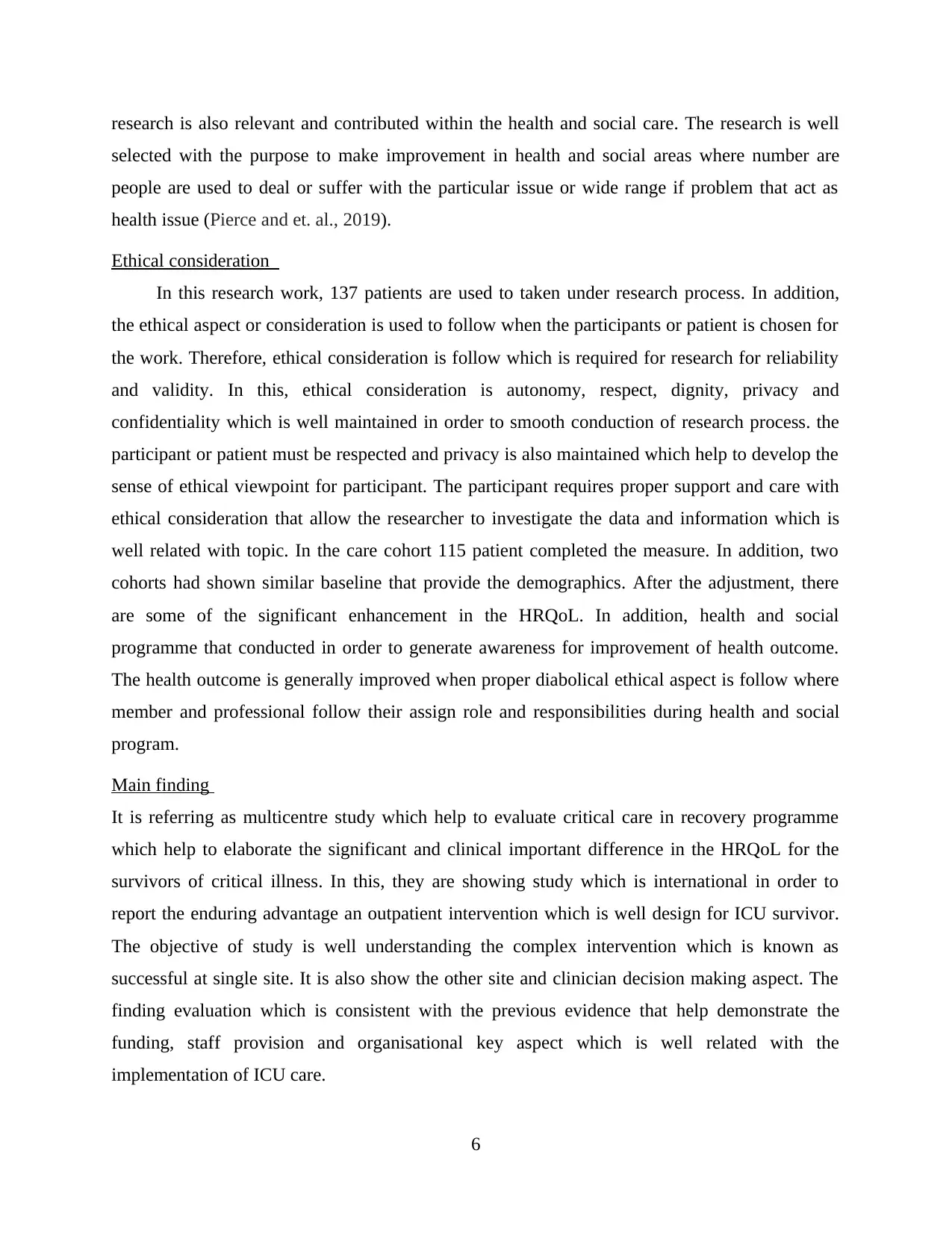
research is also relevant and contributed within the health and social care. The research is well
selected with the purpose to make improvement in health and social areas where number are
people are used to deal or suffer with the particular issue or wide range if problem that act as
health issue (Pierce and et. al., 2019).
Ethical consideration
In this research work, 137 patients are used to taken under research process. In addition,
the ethical aspect or consideration is used to follow when the participants or patient is chosen for
the work. Therefore, ethical consideration is follow which is required for research for reliability
and validity. In this, ethical consideration is autonomy, respect, dignity, privacy and
confidentiality which is well maintained in order to smooth conduction of research process. the
participant or patient must be respected and privacy is also maintained which help to develop the
sense of ethical viewpoint for participant. The participant requires proper support and care with
ethical consideration that allow the researcher to investigate the data and information which is
well related with topic. In the care cohort 115 patient completed the measure. In addition, two
cohorts had shown similar baseline that provide the demographics. After the adjustment, there
are some of the significant enhancement in the HRQoL. In addition, health and social
programme that conducted in order to generate awareness for improvement of health outcome.
The health outcome is generally improved when proper diabolical ethical aspect is follow where
member and professional follow their assign role and responsibilities during health and social
program.
Main finding
It is referring as multicentre study which help to evaluate critical care in recovery programme
which help to elaborate the significant and clinical important difference in the HRQoL for the
survivors of critical illness. In this, they are showing study which is international in order to
report the enduring advantage an outpatient intervention which is well design for ICU survivor.
The objective of study is well understanding the complex intervention which is known as
successful at single site. It is also show the other site and clinician decision making aspect. The
finding evaluation which is consistent with the previous evidence that help demonstrate the
funding, staff provision and organisational key aspect which is well related with the
implementation of ICU care.
6
selected with the purpose to make improvement in health and social areas where number are
people are used to deal or suffer with the particular issue or wide range if problem that act as
health issue (Pierce and et. al., 2019).
Ethical consideration
In this research work, 137 patients are used to taken under research process. In addition,
the ethical aspect or consideration is used to follow when the participants or patient is chosen for
the work. Therefore, ethical consideration is follow which is required for research for reliability
and validity. In this, ethical consideration is autonomy, respect, dignity, privacy and
confidentiality which is well maintained in order to smooth conduction of research process. the
participant or patient must be respected and privacy is also maintained which help to develop the
sense of ethical viewpoint for participant. The participant requires proper support and care with
ethical consideration that allow the researcher to investigate the data and information which is
well related with topic. In the care cohort 115 patient completed the measure. In addition, two
cohorts had shown similar baseline that provide the demographics. After the adjustment, there
are some of the significant enhancement in the HRQoL. In addition, health and social
programme that conducted in order to generate awareness for improvement of health outcome.
The health outcome is generally improved when proper diabolical ethical aspect is follow where
member and professional follow their assign role and responsibilities during health and social
program.
Main finding
It is referring as multicentre study which help to evaluate critical care in recovery programme
which help to elaborate the significant and clinical important difference in the HRQoL for the
survivors of critical illness. In this, they are showing study which is international in order to
report the enduring advantage an outpatient intervention which is well design for ICU survivor.
The objective of study is well understanding the complex intervention which is known as
successful at single site. It is also show the other site and clinician decision making aspect. The
finding evaluation which is consistent with the previous evidence that help demonstrate the
funding, staff provision and organisational key aspect which is well related with the
implementation of ICU care.
6
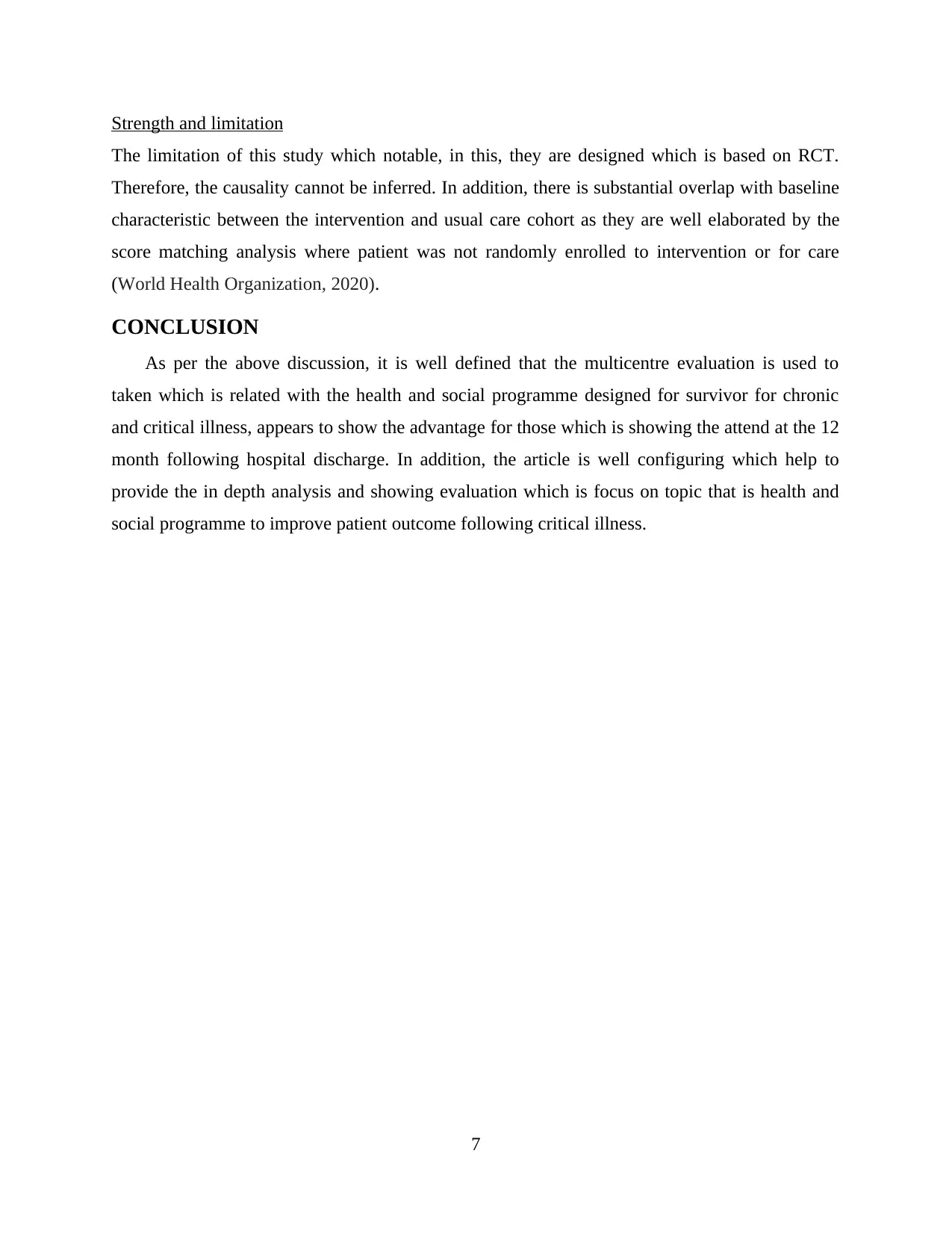
Strength and limitation
The limitation of this study which notable, in this, they are designed which is based on RCT.
Therefore, the causality cannot be inferred. In addition, there is substantial overlap with baseline
characteristic between the intervention and usual care cohort as they are well elaborated by the
score matching analysis where patient was not randomly enrolled to intervention or for care
(World Health Organization, 2020).
CONCLUSION
As per the above discussion, it is well defined that the multicentre evaluation is used to
taken which is related with the health and social programme designed for survivor for chronic
and critical illness, appears to show the advantage for those which is showing the attend at the 12
month following hospital discharge. In addition, the article is well configuring which help to
provide the in depth analysis and showing evaluation which is focus on topic that is health and
social programme to improve patient outcome following critical illness.
7
The limitation of this study which notable, in this, they are designed which is based on RCT.
Therefore, the causality cannot be inferred. In addition, there is substantial overlap with baseline
characteristic between the intervention and usual care cohort as they are well elaborated by the
score matching analysis where patient was not randomly enrolled to intervention or for care
(World Health Organization, 2020).
CONCLUSION
As per the above discussion, it is well defined that the multicentre evaluation is used to
taken which is related with the health and social programme designed for survivor for chronic
and critical illness, appears to show the advantage for those which is showing the attend at the 12
month following hospital discharge. In addition, the article is well configuring which help to
provide the in depth analysis and showing evaluation which is focus on topic that is health and
social programme to improve patient outcome following critical illness.
7
⊘ This is a preview!⊘
Do you want full access?
Subscribe today to unlock all pages.

Trusted by 1+ million students worldwide
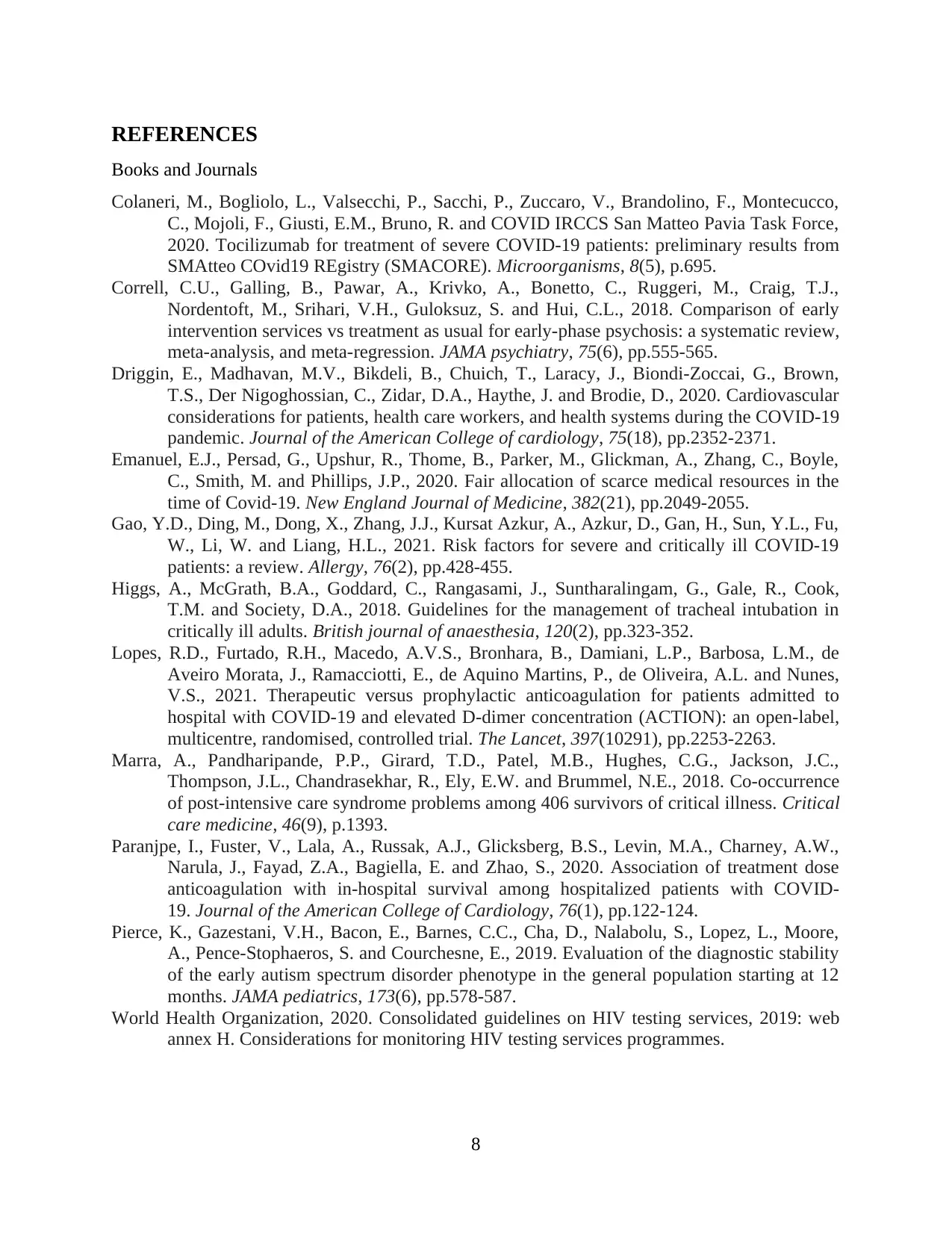
REFERENCES
Books and Journals
Colaneri, M., Bogliolo, L., Valsecchi, P., Sacchi, P., Zuccaro, V., Brandolino, F., Montecucco,
C., Mojoli, F., Giusti, E.M., Bruno, R. and COVID IRCCS San Matteo Pavia Task Force,
2020. Tocilizumab for treatment of severe COVID-19 patients: preliminary results from
SMAtteo COvid19 REgistry (SMACORE). Microorganisms, 8(5), p.695.
Correll, C.U., Galling, B., Pawar, A., Krivko, A., Bonetto, C., Ruggeri, M., Craig, T.J.,
Nordentoft, M., Srihari, V.H., Guloksuz, S. and Hui, C.L., 2018. Comparison of early
intervention services vs treatment as usual for early-phase psychosis: a systematic review,
meta-analysis, and meta-regression. JAMA psychiatry, 75(6), pp.555-565.
Driggin, E., Madhavan, M.V., Bikdeli, B., Chuich, T., Laracy, J., Biondi-Zoccai, G., Brown,
T.S., Der Nigoghossian, C., Zidar, D.A., Haythe, J. and Brodie, D., 2020. Cardiovascular
considerations for patients, health care workers, and health systems during the COVID-19
pandemic. Journal of the American College of cardiology, 75(18), pp.2352-2371.
Emanuel, E.J., Persad, G., Upshur, R., Thome, B., Parker, M., Glickman, A., Zhang, C., Boyle,
C., Smith, M. and Phillips, J.P., 2020. Fair allocation of scarce medical resources in the
time of Covid-19. New England Journal of Medicine, 382(21), pp.2049-2055.
Gao, Y.D., Ding, M., Dong, X., Zhang, J.J., Kursat Azkur, A., Azkur, D., Gan, H., Sun, Y.L., Fu,
W., Li, W. and Liang, H.L., 2021. Risk factors for severe and critically ill COVID‐19
patients: a review. Allergy, 76(2), pp.428-455.
Higgs, A., McGrath, B.A., Goddard, C., Rangasami, J., Suntharalingam, G., Gale, R., Cook,
T.M. and Society, D.A., 2018. Guidelines for the management of tracheal intubation in
critically ill adults. British journal of anaesthesia, 120(2), pp.323-352.
Lopes, R.D., Furtado, R.H., Macedo, A.V.S., Bronhara, B., Damiani, L.P., Barbosa, L.M., de
Aveiro Morata, J., Ramacciotti, E., de Aquino Martins, P., de Oliveira, A.L. and Nunes,
V.S., 2021. Therapeutic versus prophylactic anticoagulation for patients admitted to
hospital with COVID-19 and elevated D-dimer concentration (ACTION): an open-label,
multicentre, randomised, controlled trial. The Lancet, 397(10291), pp.2253-2263.
Marra, A., Pandharipande, P.P., Girard, T.D., Patel, M.B., Hughes, C.G., Jackson, J.C.,
Thompson, J.L., Chandrasekhar, R., Ely, E.W. and Brummel, N.E., 2018. Co-occurrence
of post-intensive care syndrome problems among 406 survivors of critical illness. Critical
care medicine, 46(9), p.1393.
Paranjpe, I., Fuster, V., Lala, A., Russak, A.J., Glicksberg, B.S., Levin, M.A., Charney, A.W.,
Narula, J., Fayad, Z.A., Bagiella, E. and Zhao, S., 2020. Association of treatment dose
anticoagulation with in-hospital survival among hospitalized patients with COVID-
19. Journal of the American College of Cardiology, 76(1), pp.122-124.
Pierce, K., Gazestani, V.H., Bacon, E., Barnes, C.C., Cha, D., Nalabolu, S., Lopez, L., Moore,
A., Pence-Stophaeros, S. and Courchesne, E., 2019. Evaluation of the diagnostic stability
of the early autism spectrum disorder phenotype in the general population starting at 12
months. JAMA pediatrics, 173(6), pp.578-587.
World Health Organization, 2020. Consolidated guidelines on HIV testing services, 2019: web
annex H. Considerations for monitoring HIV testing services programmes.
8
Books and Journals
Colaneri, M., Bogliolo, L., Valsecchi, P., Sacchi, P., Zuccaro, V., Brandolino, F., Montecucco,
C., Mojoli, F., Giusti, E.M., Bruno, R. and COVID IRCCS San Matteo Pavia Task Force,
2020. Tocilizumab for treatment of severe COVID-19 patients: preliminary results from
SMAtteo COvid19 REgistry (SMACORE). Microorganisms, 8(5), p.695.
Correll, C.U., Galling, B., Pawar, A., Krivko, A., Bonetto, C., Ruggeri, M., Craig, T.J.,
Nordentoft, M., Srihari, V.H., Guloksuz, S. and Hui, C.L., 2018. Comparison of early
intervention services vs treatment as usual for early-phase psychosis: a systematic review,
meta-analysis, and meta-regression. JAMA psychiatry, 75(6), pp.555-565.
Driggin, E., Madhavan, M.V., Bikdeli, B., Chuich, T., Laracy, J., Biondi-Zoccai, G., Brown,
T.S., Der Nigoghossian, C., Zidar, D.A., Haythe, J. and Brodie, D., 2020. Cardiovascular
considerations for patients, health care workers, and health systems during the COVID-19
pandemic. Journal of the American College of cardiology, 75(18), pp.2352-2371.
Emanuel, E.J., Persad, G., Upshur, R., Thome, B., Parker, M., Glickman, A., Zhang, C., Boyle,
C., Smith, M. and Phillips, J.P., 2020. Fair allocation of scarce medical resources in the
time of Covid-19. New England Journal of Medicine, 382(21), pp.2049-2055.
Gao, Y.D., Ding, M., Dong, X., Zhang, J.J., Kursat Azkur, A., Azkur, D., Gan, H., Sun, Y.L., Fu,
W., Li, W. and Liang, H.L., 2021. Risk factors for severe and critically ill COVID‐19
patients: a review. Allergy, 76(2), pp.428-455.
Higgs, A., McGrath, B.A., Goddard, C., Rangasami, J., Suntharalingam, G., Gale, R., Cook,
T.M. and Society, D.A., 2018. Guidelines for the management of tracheal intubation in
critically ill adults. British journal of anaesthesia, 120(2), pp.323-352.
Lopes, R.D., Furtado, R.H., Macedo, A.V.S., Bronhara, B., Damiani, L.P., Barbosa, L.M., de
Aveiro Morata, J., Ramacciotti, E., de Aquino Martins, P., de Oliveira, A.L. and Nunes,
V.S., 2021. Therapeutic versus prophylactic anticoagulation for patients admitted to
hospital with COVID-19 and elevated D-dimer concentration (ACTION): an open-label,
multicentre, randomised, controlled trial. The Lancet, 397(10291), pp.2253-2263.
Marra, A., Pandharipande, P.P., Girard, T.D., Patel, M.B., Hughes, C.G., Jackson, J.C.,
Thompson, J.L., Chandrasekhar, R., Ely, E.W. and Brummel, N.E., 2018. Co-occurrence
of post-intensive care syndrome problems among 406 survivors of critical illness. Critical
care medicine, 46(9), p.1393.
Paranjpe, I., Fuster, V., Lala, A., Russak, A.J., Glicksberg, B.S., Levin, M.A., Charney, A.W.,
Narula, J., Fayad, Z.A., Bagiella, E. and Zhao, S., 2020. Association of treatment dose
anticoagulation with in-hospital survival among hospitalized patients with COVID-
19. Journal of the American College of Cardiology, 76(1), pp.122-124.
Pierce, K., Gazestani, V.H., Bacon, E., Barnes, C.C., Cha, D., Nalabolu, S., Lopez, L., Moore,
A., Pence-Stophaeros, S. and Courchesne, E., 2019. Evaluation of the diagnostic stability
of the early autism spectrum disorder phenotype in the general population starting at 12
months. JAMA pediatrics, 173(6), pp.578-587.
World Health Organization, 2020. Consolidated guidelines on HIV testing services, 2019: web
annex H. Considerations for monitoring HIV testing services programmes.
8
Paraphrase This Document
Need a fresh take? Get an instant paraphrase of this document with our AI Paraphraser

9

10
⊘ This is a preview!⊘
Do you want full access?
Subscribe today to unlock all pages.

Trusted by 1+ million students worldwide
1 out of 12
Related Documents
Your All-in-One AI-Powered Toolkit for Academic Success.
+13062052269
info@desklib.com
Available 24*7 on WhatsApp / Email
![[object Object]](/_next/static/media/star-bottom.7253800d.svg)
Unlock your academic potential
Copyright © 2020–2025 A2Z Services. All Rights Reserved. Developed and managed by ZUCOL.





